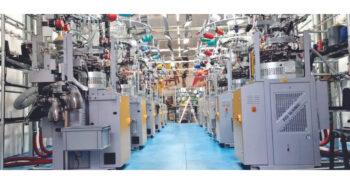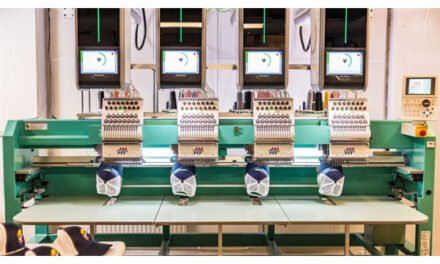 Bulgarian sock manufacturer Kingly, which recently installed a bank of the latest knitting machines from Italy’s Busi Giovanni, has outlined how its zero-waste sock knitting facility is leading the way in terms of environmentally friendly production in the hosiery industry.
Bulgarian sock manufacturer Kingly, which recently installed a bank of the latest knitting machines from Italy’s Busi Giovanni, has outlined how its zero-waste sock knitting facility is leading the way in terms of environmentally friendly production in the hosiery industry.
Rob Armour, CEO of the Sofia-based firm is adamant that competitively priced fashion does not have to mean poor quality or irresponsible methods of production. “As we become aware of these catastrophic negative impacts, we all have to look for more ways to reduce pollution, minimise carbon footprints and cut the waste this sector produces,” he sayd. “Impossible? Not at all…we’ve already started with Kingly’s socks made in a zerowaste knitting facility.”
During the manufacturing process, small factory off-cuts are produced that are a mixture of cotton, nylon, Lycra, elastane, and materials such as polyester, polypropylene and other fibres. As Armour notes, it is impossible for these off cuts to be recycled as there is no way one can separate the different fibres. For this reason, they would normally go to landfill. However, based on Kingly’s commitment to a better, cleaner environment, and in line with its ISO 14001 Environmental Policy, at Kingly, waste fibres are now retained.
The leftover fibres find a new life as stuffing for printed pillowcases, furniture and other similar applications. “This is upcycling,” says Armour. “Finding a second life is a lovely thing!” In fact, he says, this is not new. “It’s directly inspired by the Promotional Gift Award we received in 2020 for our upcycled socks in compostable bags. The socks were made from fibres mechanically recovered from recycled clothing and the bags were made of potato starch.
Re-Use or Repurpose
Kingly’s commitment to zero waste promotes a more focused way of producing and living, says Armour. “We have adopted this approach to eliminate textile waste in every aspect of production. We reduce the environmental impact of our processes and products in ways that have genuine meaning and provoke real change.”
There are other elements that Kingly considers too; for its facility to call itself truly zero waste, it factors in longevity when designing and knitting socks, ensuring they will last as long as possible for the wearer. It also uses eco-friendly, cleaner yarns, many of which are certified to the Global Recycle Standard (GRS). Further measures include using GOTS certified machines oils in its knitting machines and yarn bobbins that are made of card, which can then be recycled responsibly.
“Our organic yarns need to me the exacting criteria for GOTS,” Armour says, adding that for a textile to call itself organic cotton, production must have been without any chemical pesticides, GMO seeds or artificial fertilizers. “There are further requirements in terms of employment conditions and production methods including the use of water. Achieving the combination is a challenge.
“We are delighted then that we have been approved for GOTS certification, one of only 52 sock manufacturers worldwide to meet the standards. On top of that, our GOTS certified cotton stocks have been awarded the 2022 Promotional Gift Award.”
Armour also highlights how the social element is as important as the rest of the processes involved. “We are SEDEX Pillar 4 approved,” he explains, which means the company’s working practices and those in its supply chain are assessed as to working conditions and meet demanding minimum criteria. “For Kingly, it’s not just about eliminating waste – it’s also about the people behind the company. Values are important. Our machinery also runs on a central vacuum system, which reduces the amount of kW used and thus drops the electricity bill. Noise is reduced, which is a direct benefit for our sock technicians.”
Standards
Kingly has also been accredited to other eco-standards and labels following the production of more than 34,000 pairs of socks on Busi’s Light MP series of knitting machines. Produced from upcycled yarns, which require less water, Kingly says it has saved 24 mn litres, a factor, which played a key role in it receiving accreditation from sustainability platform BCOME Cradle-To-Grave.
The Busi Light MP is a high production, single cylinder machine for the production of casual socks for men, women and children.
This machine is capable of knitting both plain and terry fabric with the needle selection made by 8 electromechanical actuators that enables the production of double welt, embroidery patterns in 5 colours plus the ground, embroidery patterns on a mock rib elastic base in 5 colours plus the ground and floated mesh patterns with additional 4 colour patterns.
The Light MP is also equipped with an automatic terry device for the production of plain stich, half terry and full terry in the same sock without the need for any manual change as well as an electronic device that controls the speed of the saw blade thereby enabling the machine to produce different lengths of the cut strings.
Available diameters are 3 ¼, 3 ½, 3 ¾ and 4 ins in gauges 24, 36 and 48 with up to 200 needles, while Busi’s renowned Rimaglio toe-closing system is also available on request.
“Kingly’s zero-waste facility is a benchmark that other manufacturers should aim to match,” says Armour. “Crucially we have been able to introduce these changes and meet these standards, and remain profitable. Our initializes have a positive effect on making sustainability achievable in an industry notorious for its waste. If we can do it, others can too”.





















